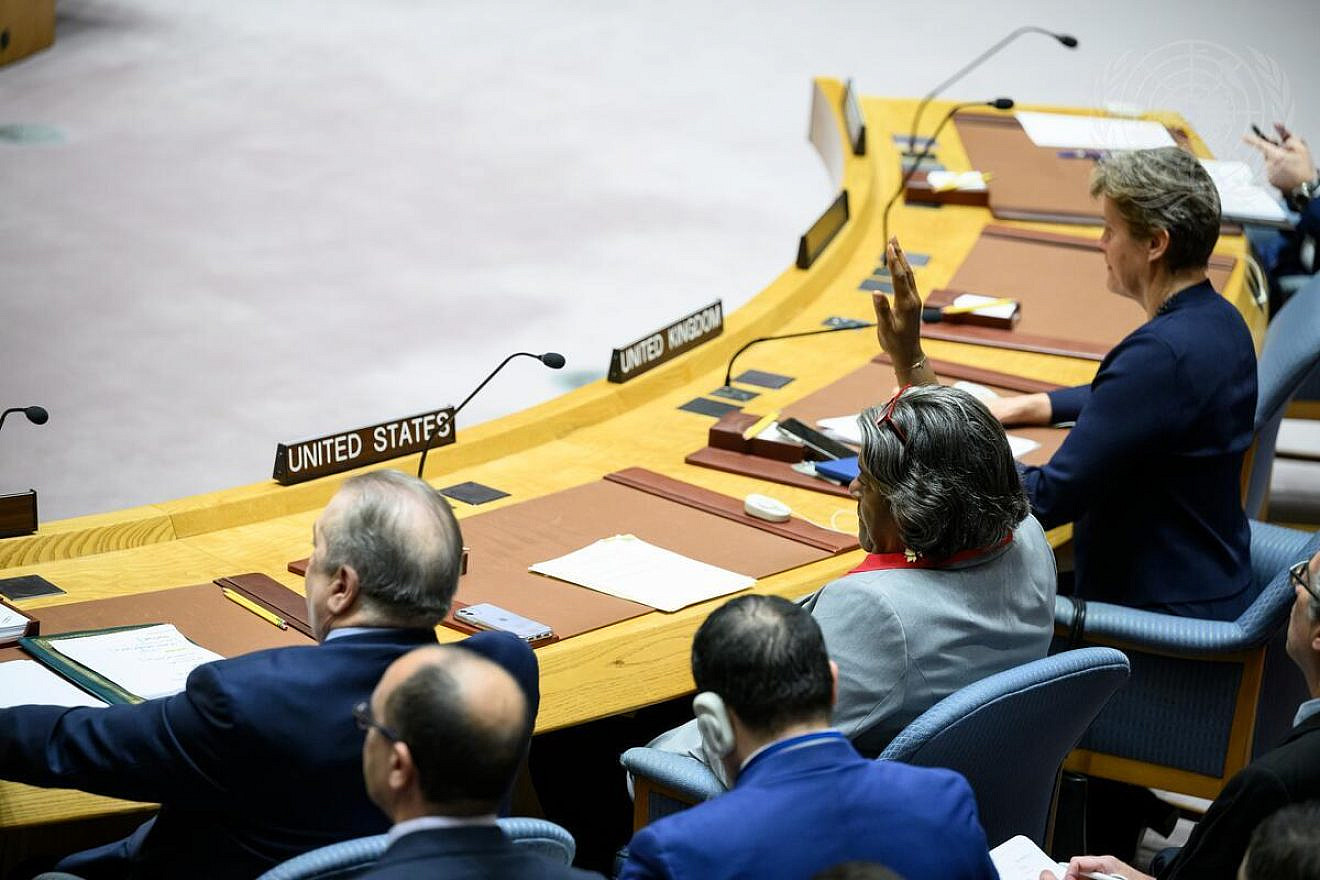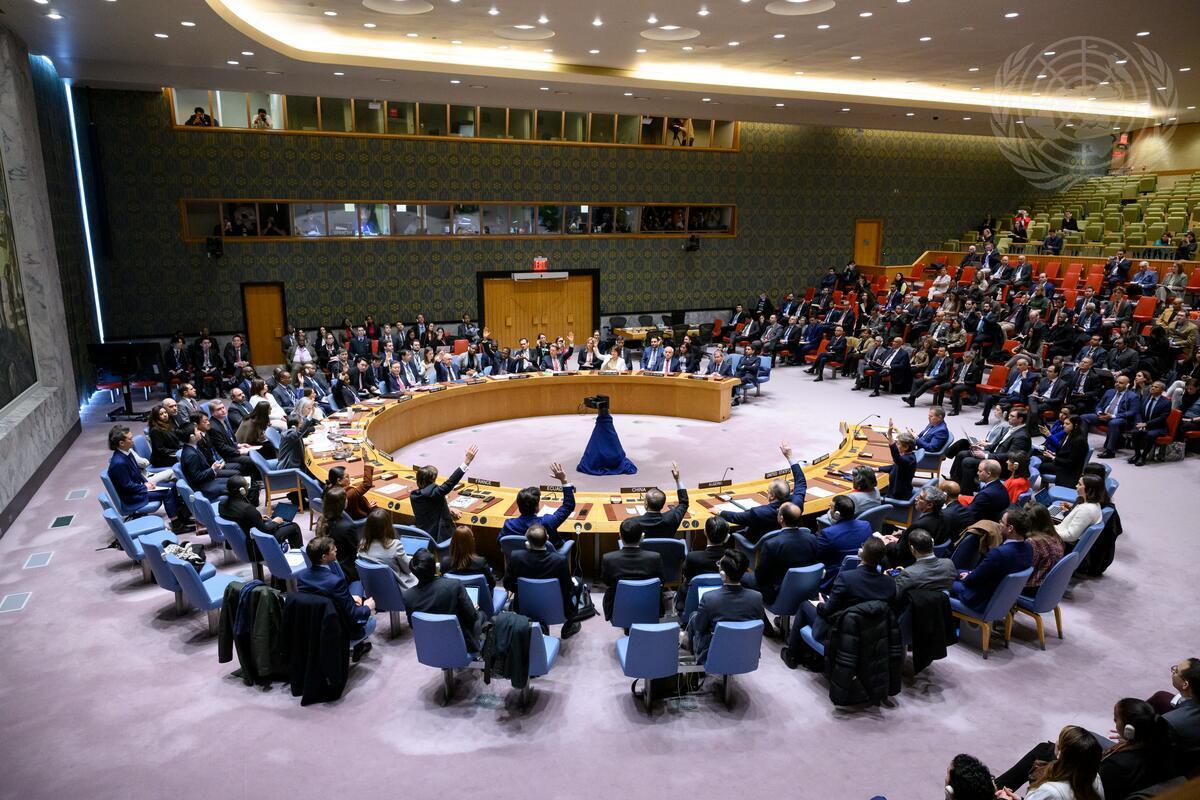US abstains as UN Security Council unanimously passes ceasefire resolution
Israeli Prime Minister Benjamin Netanyahu subsequently canceled a high-level delegation to Washington that was to discuss military operations in Rafah.

The U.N. Security Council unanimously passed a resolution that demands a ceasefire for the rest of the Muslim holiday of Ramadan and the release of all hostages being held captive by Hamas in the Gaza Strip.
Washington abstained in the 14-0 vote on Monday. As one of the council’s permanent members, the United States could have vetoed the resolution, which the 10 elected, non-permanent members (E10) of the council drafted and circulated.
The resolution “demands an immediate ceasefire for the month of Ramadan respected by all parties leading to a lasting ceasefire and also demands the immediate and conditional release of all hostages.”
It also demands compliance with international law in the treatment of detainees and emphasizes the urgent need to expand the flow of humanitarian aid to Gaza and demands that barriers preventing that be lifted.
Ramadan lasts for about another two weeks.
The resolution appears to leave it open to interpretation whether the ceasefire and the release of Israeli hostages are connected.
Prior to the vote, Israeli Prime Minister Benjamin Netanyahu threatened to cancel a high-level Israeli delegation to Washington if the United States did not veto the resolution. After the vote, Netanyahu confirmed that he canceled the delegation.
The delegation was to discuss the Jewish state’s plans for a military operation in the southernmost city of Rafah, according to Israel, while Washington had said the discussion would be about alternatives to a military operation there.
The Israeli mission to the United Nations declined to comment to JNS ahead of the vote.
The resolution is only the third of 10 upon which the council has voted about the Israel-Hamas war to pass and only the first focused on hostilities, rather than humanitarian aid. The United States demanded a last-minute change, with a text change from calling for a “permanent” ceasefire to a “lasting” one.
“Our vote does not represent a shift in our policy,” John Kirby, White House national security communications advisor, told reporters on Monday morning. “There is no reason for this to be seen as some sort of escalation. There’s no reason for it to be an escalation.”
Asked about how the resolution didn’t represent a departure from prior U.S. policy, given it didn’t appear to link the ceasefire and hostage release, Kirby rejected the characterization of the question.
“I’ve looked at it. It does talk about the need for an immediate ceasefire and an immediate release of the hostages. That’s what we want,” he said. “Those are the same principles that we’ve been arguing for now for many months.”
Kirby said he has no information about Washington being notified about an Israeli delegation being canceled. He noted that Yoav Gallant, the Israeli defense minister, is in Washington today and tomorrow.
“He’s meeting with Secretary [of State Antony] Blinken and he’s going to meet with Jake [Sullivan, the national security advisor] and he’s also going to get a chance to meet with Secretary [of Defense Lloyd] Austin,” Kirby said. “I have no doubt that in those discussions we will have ample opportunities to talk with him about what’s going on with their planning in Rafah.”
“We were looking forward to having an opportunity to speak to an Israeli delegation later this week,” Kirby added. “I’ll let the Israelis speak to whether they’re coming or not.”
 The
U.N. Security Council adopts Resolution 2728 (2024) 14-0, demanding an
immediate ceasefire to Israel’s war with Hamas in the Gaza Strip during
Ramadan and immediate release of all hostages taken from Israel and
being held in Gaza, with Washington abstaining, March 25, 2024
The
U.N. Security Council adopts Resolution 2728 (2024) 14-0, demanding an
immediate ceasefire to Israel’s war with Hamas in the Gaza Strip during
Ramadan and immediate release of all hostages taken from Israel and
being held in Gaza, with Washington abstaining, March 25, 2024
‘We did not agree with everything’
Asked if the vote would impact the already-scheduled meetings in Washington with Gallant that hadn’t yet occurred, Kirby said, “Why don’t we have the meetings and see how they go?”
“Those are pretty weighty meetings,” he said.
Washington has vetoed prior resolutions and amendments calling for a ceasefire, stating that their passage would upset or upend delicate Israel-Hamas negotiations.
While “acknowledging” ongoing brokered negotiations, the resolution passed on Monday was worded to de-emphasize those talks in favor of the urgency of a ceasefire.
The E10-drafted resolution was initially slated to be voted upon on Friday morning but was pulled in favor of negotiations over the weekend, leading to Monday’s vote.
Those negotiations led to coupling the ceasefire and hostage release demands in the same paragraph, as opposed to the original separation of the two, indicating Washington’s signaling that the two should be of equal urgency and, possibly, tied together in effect.
“Colleagues, we appreciated the willingness of members of this council to take some of our edits and improve upon this resolution. Still, certain key edits were ignored, including our request to add a condemnation of Hamas,” stated Linda Thomas-Greenfield, U.S. ambassador to the United Nations, explaining Washington’s abstention.
“We did not agree with everything in this resolution. For that reason, we were unfortunately not able to vote yes,” Thomas-Greenfield said. “We fully support some of the critical objectives in this nonbinding resolution. And we believe it was important for the council to speak out and make clear that any ceasefire must come with the release of all hostages. “
No comments:
Post a Comment